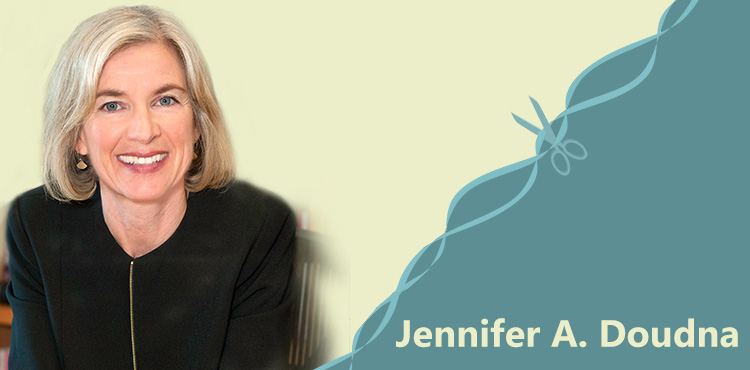
Jennifer A. Doudna
Investigator, Howard Hughes Medical Institute; Professor of Chemistry,
Professor of Molecular and Cell Biology,
University of California, Berkeley, USA
CRISPR Biology Guides the Future of Genome Editing
Fundamental research to understand how bacteria fight viral infections uncovered programmable proteins that detect and cut specific DNA sequences. In collaboration with Emmanuelle Charpentier’s laboratory, we determined how the enzyme Cas9, which is part of CRISPR-Cas adaptive bacterial immunity, can be harnessed as a powerful technology to alter genomic sequences in cells. This created a simple, precise and widely adaptable technology for genome editing in any cell or organism. Current research is exploring the diversity of CRISPR-Cas systems in microbes and developing genome editing for biomedical and agricultural applications. I have also been deeply involved in discussing the ethical and societal implications of genome editing.As an internationally renowned professor of Chemistry and Molecular and Cell Biology at UC Berkeley, Doudna and her colleagues rocked the research world in 2012 by first describing a simple way of editing the DNA of any organism using an RNA-guided protein found in bacteria. This breakthrough technology, called CRISPR-Cas9, has redefined the possibilities for human and non-human applications of gene editing, including opening up and accelerating the development of new genetic surgeries to cure disease, novel ways to care for the environment, and nutritious foods for a growing global population challenged by climate change.
Doudna is also the Executive Director of the Innovative Genomics Institute and an Investigator with the Howard Hughes Medical Institute. She is a member of the National Academy of Sciences, the National Academy of Medicine, the National Academy of Inventors, and the American Academy of Arts and Sciences. She is also a Foreign Member of the Royal Society and has received many other honors including the Breakthrough Prize in Life Sciences, the Heineken Prize, the BBVA Foundation Frontiers of Knowledge Award, the Japan Prize, and the Kavli Prize. She is the co-author with Sam Sternberg of “A Crack in Creation”, a personal account of her research and the societal and ethical implications of gene editing.
- 2018 V de Vida Award, Asociación Española Contra el Cáncer
- 2018 Kavli Prize in Nanoscience
- 2018 Royal Society - Croonian Medal
- 2018 National Academy of Sciences Award in Chemical Sciences
- 2018 Gustavus John Esselen Award for Chemistry, Northeastern Section Chemical Society Inc.
- 2018 Fellow of the American Association for Cancer Research
- 2018 Lila & Murray Gruber Memorial Cancer Research Award, American Academy of Dermatology (AAD)
- 2018 Dickson Prize in Science, Carnegie Mellon University
- 2017 Edward O. Wilson and George Stibitz Award
- 2017 Golden Plate Award, International Achievement Org.
- 2017 Albert Einstein Foundation Award
- 2017 Wallace H. Coulter Award
- 2017 Albany Medical Center Prize
- 2017 BBVA Frontiers of Knowledge Award, Spain
- 2017 F.A. Cotton Medal
- 2017 Fellow, American Association for Cancer Research
- 2017 Japan Prize, Japan
- 2017 Luminary Award, Precision Medicine World Conference
- 2016 Heineken Prize, Netherlands
- 2016 Tang Prize in Biopharmaceutical Science, Taiwan
- 2016 Paul Allen Distinguished Investigator
- 2016 Canada Gairdner Prize, Canada
- 2016 Warren Alpert Foundation Prize, Harvard Medical School
- 2016 Nakasone Award, Human Frontier Science Program
- 2016 Paul Ehrlich and Ludwig Darmstaedter Prize, Germany
- 2016 L’Oreal-UNESCO International Prize for Women in Science

